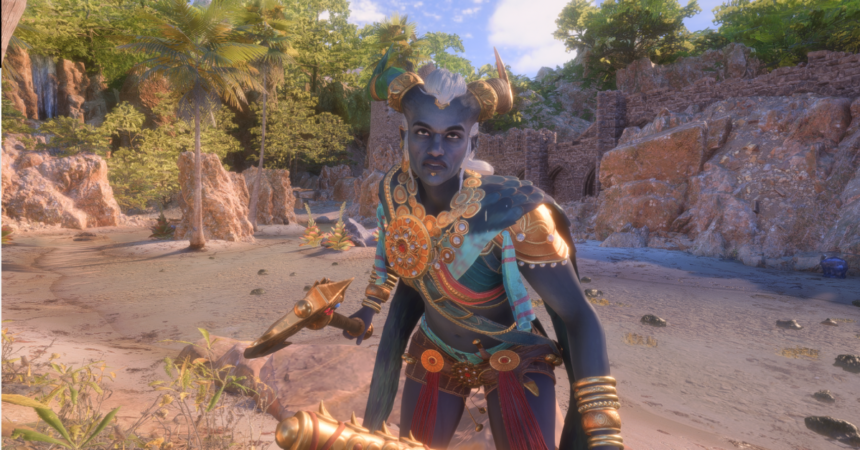Dragon Age: The Veilguard doesn’t have the same broad, sweeping choices at the end of every chapter as its predecessors, but it does spend quite a bit of time allowing the player to figure out how they feel about their Rook. Does your Rook believe in the Maker, the Dragon Age equivalent of God? What’s your Rook’s favorite coffee, or are they more of a tea enjoyer? One route that surprised me is that you can establish your Rook as trans and/or nonbinary, and dialogue options relating to that are sprinkled throughout the game in unexpected places.
Early on in the game, Rook unpacks their room at the Lighthouse and ponders four items: an item relating to their heritage; tools of the trade for their class as a rogue, mage, or warrior; a token from their background faction; and a handheld mirror. The handheld mirror allows Rook to reflect on their own identity as a hero. This includes some additional trees for scars, tattoos, and a trans/nonbinary identity. (For example, a Dalish Rook might take the opportunity to comment on the pride they feel over their vallaslin facial tattoos.)
The wording of these options can be a bit confusing. If I pick an option relating to being trans while gazing into Varric’s mirror, I get a message: “Establishes transgender identity and unlocks new dialogue options in future conversations.” I did not pick those options, and so I thought that I might be locked out of all future branches. This isn’t true; even if you don’t identify as trans while examining the mirror, you can still choose trans and nonbinary dialogue options later in the game.

Image: BioWare/Electronic Arts via todayeducationnews
I have to admit, I was skeptical when I first saw this branch come up. I’ve had the option to establish a trans identity during character creation in other RPGs, like Saints Row 2 or Cyberpunk 2077, but I haven’t experienced a big RPG where that comes into play during conversations. Trans representation in RPGs can be hit or miss; when done well, it rounds out the world and adds depth to the supporting cast. When it’s done poorly, it’s clunky or perhaps a bit cringe. The Veilguard is a game about fighting gods and saving the world. When would the party even have time to mention these questions of inner identity?
As it turns out, The Veilguard’s writers did a great job at setting the stage for these conversation options. The first few hours of the game are a sprint, where Rook collects a party of adventurers, confronts the gods, and fights their way through hordes of Darkspawn and Venatori. Once the full party is together, the narrative slows down, and the party members each realize that they all have their own inner struggles to address. This is where The Veilguard shines — I don’t really care too much about the elven gods, but I love my team and relish the opportunity to spend more time with them.
It’s during these low-stakes moments, when I’m commiserating with the Antivan Crow Lucanis about the stresses of growing up as the heir to an assassin empire, or flirting with the Grey Warden Davrin, that I have the opportunity to have Rook refer to their nonbinary or trans identity. These options are perhaps the most useful with Taash, a Qunari who is struggling with their own gender identity and relationship to both the Qun and Rivain.

Image: BioWare/Electronic Arts via todayeducationnews
The Qun, similar to some real-world theocratic societies, is fine with binary trans individuals; their identity is acknowledged, and they are assigned to the appropriately gendered role under the Qun. Nonbinary individuals, however, are not acknowledged. This puts Taash in a tough place, one that I obviously sympathized with as a nonbinary player. Once again, that special conversation tree opened up — and I was surprised to find that it led to a touching conversation that was organic, clearly written with empathy, and both true to my experience and natural to the Dragon Age fiction.
In the end, these options don’t significantly change The Veilguard. But this is a game where the journey is as important as, if not more so than, the destination. Hanging out with my pals, helping them sort through their issues, and fostering those bonds is a huge part of the game. It has always been a big pillar of the Dragon Age franchise. The Veilguard just takes that a step further, and delves deeper into a particular wrinkle of representation. I’m glad this experiment was a success, and I’d love to see this care put into future RPGs.










